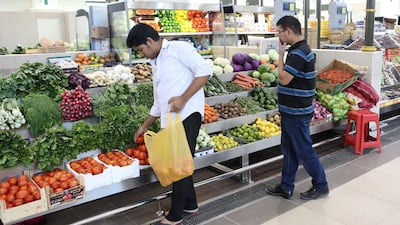SHARJAH // Shoppers should not worry about a rise in prices for fruit and vegetables after a ban on produce from Middle East countries began on Monday, the government says.
Restrictions on produce from Egypt, Oman, Jordan, Lebanon and Yemen were imposed after they were found to have high levels of pesticides.
But other nearby markets will ensure supply and keep down the prices, said Dr Hashim Al Nuaimi, director of the consumer protection department at the Ministry of Economy.
“Due to the strategic position of the UAE, several markets from close countries like India, Iran and Holland are there to fill the demand,” Dr Al Nuaimi said at the Sharjah Co-operative Society yesterday.
“There is also Morocco and Algeria. Prices have not increased since the ban came into force.”
Vipin Sidhart, a sales manager at Mehtab Vegetables and Fruits in Dubai, said: “The prices are almost the same.
“We did not see any impact from the ban yesterday or today, and it seems there won’t be any problem in the foreseeable future.
“We have alternative options. We can get it from Holland, Thailand, Iran and as far as the US – it all depends on the season and type of produce we want.
“We depend on the local produce for some items, and we can import it from other countries if there is none or a shortage in supply here.”
Countries affected by the ban should submit certificates to indicate that their produce is free of pesticide residue before it can be imported.
The ministry said pesticides, particularly those derived from chlorine, were harmful because they can accumulate to dangerous levels in the body and environment.
All fresh produce and processed foods are tested by the ministry in laboratories accredited by the British Commission for Accreditation to ensure they meet international standards.
At the Sharjah Co-operative Society event, it was announced that Dh30 million had been allocated to subsidise 1,000 essential foods during Ramadan, and 200 other products will have fixed prices.
“The aim of these subsidies is to alleviate the pressure on residents during the holy month, as their demand for essential food items increases,” said Majid Al Junaid, director of Sharjah Co-operative Society.
He said that significant discounts started yesterday at 29 co-operative stores in Sharjah. The co-ops have increased the number of subsidised items from 300 last year.
“Prices have been slashed to between 20 and 50 per cent less than the product cost to enable residents to acquire all their needs before and during the holy month,” Mr Al Junaid said.
To prepare for the Ramadan rush, the co-op started stocking up two months ago.
“Residents also have the option to purchase Ramadan baskets, which include all the essential foodstuffs at reasonable prices,” Mr Al Junaid said. “This year, we increased the number of promotions from three to seven during the holy month.”
The list of banned produce includes all varieties of pepper from Egypt; peppers, cabbage, cauliflower, lettuce, squash, beans and aubergine from Jordan; apples from Lebanon; melons, carrots and watercress from Oman; and all types of fruit from Yemen.
tzriqat@thenational.ae

